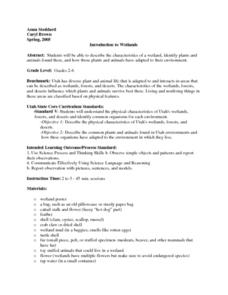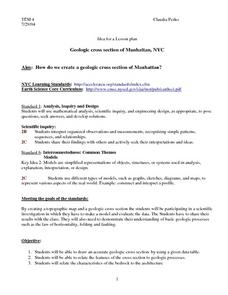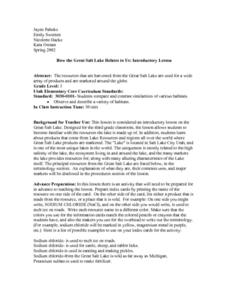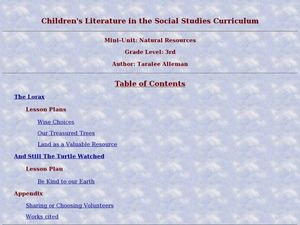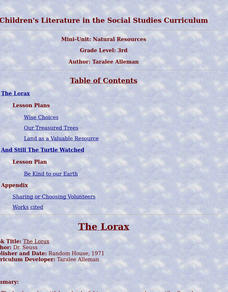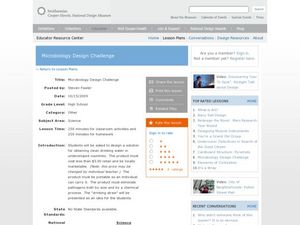Curated OER
The Wetlands
Fourth graders learn what a wetland is, where they can be found, and what types of plants, animals and characteristic are associated with the wetlands. They also participate in an activity to explore and enhance their knowledge of...
Curated OER
Two-Cell Battery
Students build their own two-cell battery and determine which electrolyte solution is best suited for making a battery. They discuss background information for their experiment, construct and test their battery, and using the chart on...
Curated OER
Go with the Flow
Students gain an understanding of the difference between electrical conductors and insulators, and experience recognizing a conductor by its material properties. They build a conductivity tester to determine whether different objects are...
Curated OER
Bulbs & Batteries in a Row
Students investigate simple series circuits and their properties. In small groups they draw a circuit diagram on their Series Circuit Building worksheet, follow step-by-step directions to construct a simple series circuit, and solve...
Curated OER
Introduction to Wetlands
Students describe the characteristics of a wetland, identify plants and animals found there, and how those plants and animals have adapted to their environment. They visit stations, view a video, and complete a KWL about the wetlands.
Curated OER
Which Part of the Great Salt Lake Stinks More?
Students research background knowledge of the Great Salt Lake prior to a field trip. They identify specific wild life at the Great Salt Lake on the field trip and identify the islands in the Great Salt Lake. They present their...
Curated OER
Fruit and Seeds Project
In this nature worksheet, students observe 6 different fruits. Students cut each fruit in half and study the seeds inside. Students record their observations and practice writing the fruit names.
Curated OER
Take Charge!
Students induce an electrical charge on various objects, and experiment with electrical repulsion and attraction. They define related vocabulary, play Bingo and complete a take-home quiz.
Curated OER
Parts of an Ecosystem
Fourth graders study the Great Salt lake and the ecosystem that encompasses it. They study the relationship between an individual of a species, a population of that species, a community that includes that population, and the...
Curated OER
Oxidation and Salt
Students study the reaction on iron in water, air, and sodium chloride. They create a situation that shows this process and gives them the opportunity to hypothesize what, why, and how. They keep records and do an oral and written ...
Curated OER
Winogradsky Column Unit
Students are introduced to two changes, physical and chemicl, in order to prepare them to comprehend what changes take place in a Winogradsky Column. They participate in two activities including completion of a worksheet, balloon...
Curated OER
Mystery Creek
Fourth graders are introduced to the Riparian Ecosystem. They define the following terms: riparian and riparian ecosystem. Students take a trip to the creek, where they make observations about the environment around them. They are...
Curated OER
The Urban Heat Island Effect - Lesson 2 (Grade 5)
Fifth graders use the scientific process to examine how when various surfaces are exposed to similar environmental conditions, surface temperatures may vary. They conduct an experiment to show the relationship between surface and...
Curated OER
Geologic cross section of Manhattan, NYC
Students draw an accurate geologic cross section by using a given data table. They relate the features of the cross section to geologic processes. Students then relate the characteristics of the bedrock to the architecture.
Curated OER
Predator Or Prey?
Students study the concept of predator/prey by researching specific examples of birds. They participate in a concept map/webbing activity to determine different characteristics of birds. They engage in a class discussion about...
Curated OER
States of Matter
Fourth graders define the term matter. They compare properties of solids, liquids, and gases. They describe how matter changes from one state to another. They classify objects as either solid, liquid, or gas.
Curated OER
For the Birds
Second graders explore biology by creating birdhouses. For this bird identification lesson, 2nd graders discuss the different types of birds that live in their environment and what characteristics each type of bird has. Students create a...
Curated OER
Exploring the Great Salt Lake
Third graders participate in a scavenger hunt, looking for things that are unique about the ecosystem in and around the lake. They observe and describe a variety of habitats and distinguish living and nonliving elements of...
Curated OER
How the Great Salt Lake Relates To Us
Third graders name at least three resources that come for the Great Salt Lake. They describe at least one product that is made from each resource. They name and locate on a map at least five different geographic regions where Great...
Curated OER
A Shredding We Will Go
Students take charge of a recycling project . In this environmental issues lesson, students manage a paper recycling project and use compost made from the recycled paper to beautify trees.
Curated OER
The Lorax
Third graders identify environmental problems. In this natural resources lesson plan students participate in several activities that support critical thinking about the environment and natural resources. The students write, list, and...
Curated OER
Land as a Valuable Resource
Students investigate why the soil is important to our lives. In this natural resources lesson, students have a farmer as a guest speaker. Students begin to understand how farmers use and protect our natural resource. Students write...
Curated OER
Reel in Learning with Reptiles
Whether it’s all about a Jackson Chameleon or a North American Bearded Lizard, learners will be eager to embark on informational text with reptiles.
Curated OER
Microbiology Design Challenge
Students discover dangers to human health by researching what's in our drinking water. In this water purification lesson, students discuss the conditions of water in undeveloped countries and why it is unsafe to drink. Students work in...






